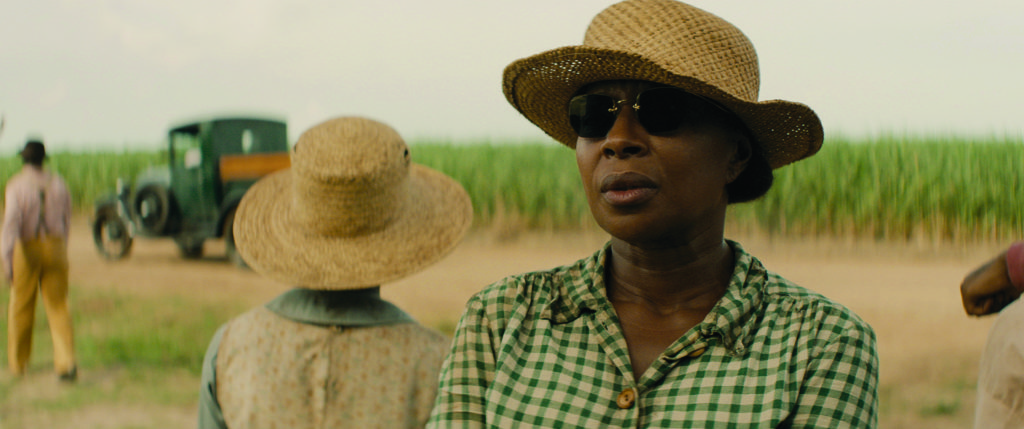Every so often, a filmmaker comes along who proves himself or herself as a master of their craft. In 2017, that filmmaker is Dee Rees. Her breakout first feature, 2011’s “Pariah,” is a low-budget independent film about the adolescence of a black lesbian teenager. Jump forward a few years and some television work later, and Rees has produced an earth-shattering period epic the likes of which American cinema has not seen for nearly 20 years. Based on the novel of the same name by Hillary Jordan, starring a tremendous cast and risking it all on a new distribution model, Rees’ film “Mudbound” feels as though it is the start of a medium’s new era reflecting on its old ways.
Mostly set in the period immediately after World War II, “Mudbound” follows the intersecting lives of two families in the Mississippi Delta. The McAllans, a white landowning family, relocate to the Delta on the whim of their patriarch Henry (Jason Clarke), who dreams of owning a farm. Henry’s wife Laura (Carey Mulligan) is an intellectual held back by her husband and the land they live on. Also boarding with them is Henry’s racist Pappy (Jonathan Banks). Rounding out the clan is the family’s younger brother Jamie (Garrett Hedlund), a charming Air Force hero who returns from serving in Europe.
Living as share tenants on the McAllans’ land are the Jacksons, a family of black farmers who dream of owning their own land one day. Hap (Rob Morgan) takes on the brunt of the labor during the week, moonlighting as a preacher on Sundays. Sharing his dream is his wife Florence (Mary J. Blige). The couple’s eldest son Ronsel (Jason Mitchell), a veteran of a tank battalion, leaves behind his love in Germany to return home and work the farm with his father. When Ronsel and Jamie quickly become close friends — bonding over their shared experiences in the war — their challenge to the strictly enforced social order creates chasms in the families’ volatile relationship and the community at large.
Even though it may sound densely plotted at first, “Mudbound” is far from story heavy. There are flashbacks to Jamie’s and Ronsel’s time in combat throughout, but Rees and co-writer Virgil Williams spend most of the film’s hefty 134-minute runtime exploring each character as deeply as possible in both major and minor moments. They achieve that exploration through overlapping voice-overs, which are a tough sell at first, going against some viewers’ instincts to categorize the format as lazy. However, the voice-overs welcome the audience into each character’s inner thoughts, painting a multifaceted portrait of the entire cast of characters in the way that a novel would.
This achievement takes the collective work of an entire cast of dedicated performers. Luckily, Rees has just that. No member of the ensemble outshines another, and there are no huge moments for anyone that scream an obvious Oscar clip. Non-traditionally, even for such an ensemble piece, the focus is on the body of characters and the ways in which they interact with one another. Special attention can be paid to certain performers, however, as both Hedlund and Mitchell prove themselves as some of the most gifted and undervalued actors of their generation, while Blige is simply extraordinary as Florence — a rare case of a famous musician completely disappearing into her role.
Despite the intimate focus on the characters, “Mudbound” is breathtaking in its epic production values. The film sweeps you up, with cinematographer Rachel Morrison’s immaculate images enveloping the beauty and brutality of the deep, brown Southern landscape. The period details are perfectly designed, while the sounds of nature and singer-songwriter Tamar-kali’s score punctuate the historical world.
Perhaps the film’s most unsung hero is editor Mako Kamitsuna, whose work with disjointed time is nothing short of stunning. Thrilling combat sequences interrupt the quiet terror of country life, while the logical flow of time is upended in favor of a more emotionally centered narrative structure.
All in all, it comes back to Rees, whose sprawling, dioramic vision of America’s dark past is one to behold. Her timeless interrogations of race, class, gender, family and social power are equally masterful, leaving the viewer with an endless amount of material to chew on upon leaving the theater — though many won’t be seeing it in that setting. It’s a film that deserves to be seen on the biggest screen possible, but Netflix acquired the film out of the Sundance Film Festival for a lofty sum. The company is rolling it out in select theaters at the same time as its streaming debut, along with an attempted awards campaign on Nov. 17.
It’s a huge risk on Rees’ part to wager such an important film’s success on a troublesome distributor, but there is hope to be found in her rationale. “Pariah” would have never been the success it was without the exposure of the streaming giant, and perhaps the same will be true of “Mudbound,” the newest classic of American cinema. If there’s anyone who can make it work, though, it’s Rees, and the possibilities are endless as to what part of America’s legacy she’ll explore next.
Grade: A






